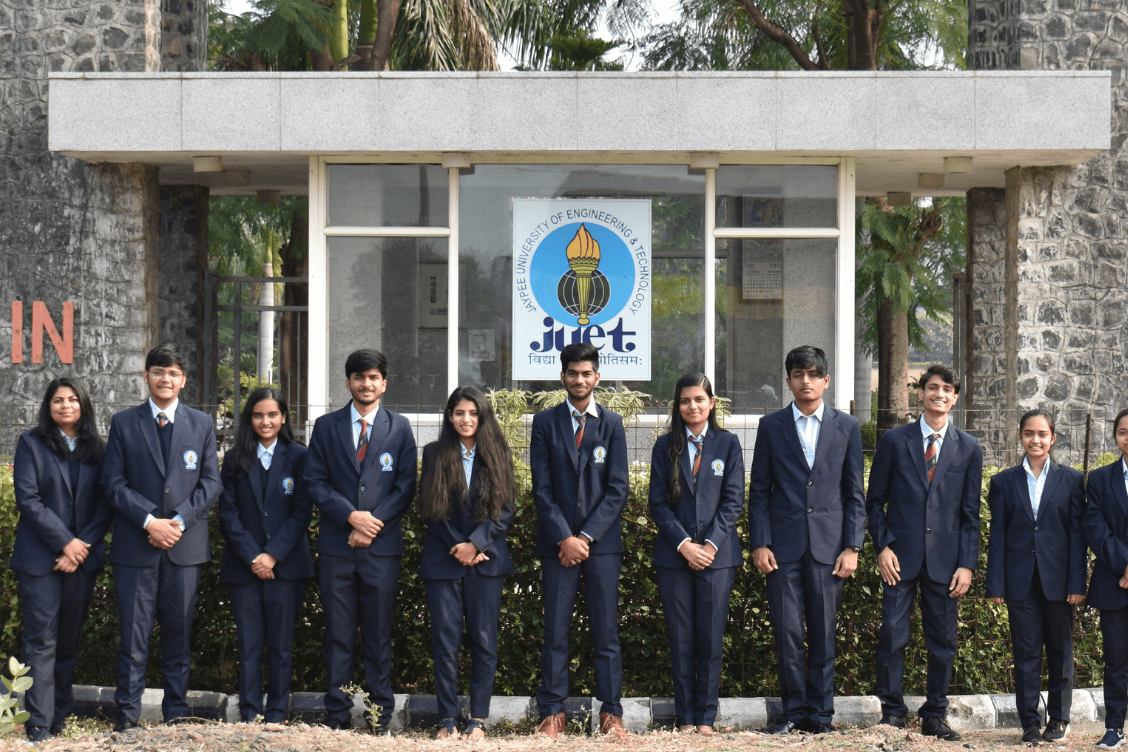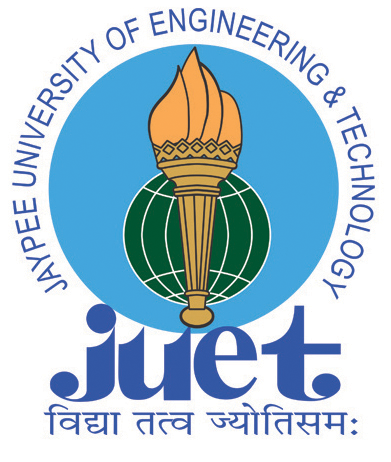The Department of Civil Engineering at Jaypee University of Engineering and Technology, Guna was formed in 2003, to address the needs of technical manpower for industry, R&D organizations and academic institutions.
Aim of the Department is to graduate the students who are socially aware and have deep understanding of fundamental principles to solve problems and meet challenges in the Civil Engineering domain of design, construction, research and management in various disciplines. The Department also encourages its students to engage in extra-curricular and co-curricular activities, to provide a platform in order to showcase and sharpen their technical skills, to make them confident in the field of Civil Engineering profession. The faculty members of the department are involved in high quality multidisciplinary research, consultancy and academic leadership role through B.Tech, M.Tech, Ph.D. and Diploma programs.
The broad objective of the department is to achieve international recognition for excellence in research and teaching such that it becomes top choice of students for technical education in Civil Engineering. The department is fully committed to serve the nation by providing excellent quality engineers through specialization courses in Construction Management, Structural Engineering and Environmental Engineering at M.Tech level. Department also offers Ph.D program in Hydraulics & Water Resources, Transportation Engineering, Geotechnical Engineering, Concrete Technology, Sustainable Materials, Rock Mechanics and Environmental Engineering. The department ensures regular updating of the curriculum of all courses in consultation with industries, academician and other stake holders through Board of Studies (BOS) and Academic Council (AC).
All the courses at UG/PG level are supplemented by imparting practical knowledge through well-equipped laboratories such as:
1. Concrete Technology & Structural Engineering Laboratory
2. Geotechnical Engineering Laboratory
3. Highway Engineering Laboratory
4. Fluid Mechanics and Fluid Machinery Laboratory
5. Environmental Engineering Laboratory
6. Surveying Laboratory
7. Engineering Graphics & AutoCAD
8. Software Simulation Laboratory
9. Workshop Practice Laboratory

Department is providing testing & consultancy services and has filed patents through research work and sponsored projects. Conduction of training programs, expert lectures by eminent persons, field visits, workshops and conferences has been a regular practice to provide a platform for sharing and updating current state of knowledge through industry – institute interaction.
To disseminate state-of-art knowledge by empowering graduates to design, develop and effectively lead in the area of Civil Engineering through an advanced understanding of globalization and sustainability to serve the society.
To impart quality education that brings out Civil Engineers with high technical competencies and promotes high-end research to meet challenges in Civil Engineering.
To develop students with sound knowledge of contemporary philosophies of design and innovation, including IT based solutions and entrepreneurship skills.
To empower graduates with multidisciplinary approach and sound technical knowledge to fulfill societal needs.
Master of Technology (M.Tech.) program in
Structural Engineering,
Construction Management,
Environmental Engineering
Program Educational Objectives (PEO):
PEO-1: To actively engage in problem-solving using Engineering principles to deal with the growing needs of the society.
PEO-2: To be able to succeed in positions in civil Engineering practice or research, and in other fields, they choose to pursue and enroll in advanced studies.
PEO-3: To develop the professional attitude and ethical competencies, so that the students would be able to face the work-life and personal challenges with utmost grace, and make positive impact on the environment and society.
Program Outcomes (PO):
PO-1: Engineering Knowledge: Apply the knowledge of mathematics, science, engineering fundamentals, and an engineering specialization to the solution of complex engineering problems.
PO-2: Problem analysis: Identify, formulate, review research literature, and analyze complex engineering problems reaching substantiated conclusions using first principles of mathematics, natural sciences, and engineering sciences.
PO-3: Design/development of solutions: Design solutions for complex engineering problems and design system components or processes that meet the specified needs with appropriate consideration for the public health and safety, and the cultural, societal, and environmental considerations.
PO-4: Conduct investigations of complex problems : Use research-based knowledge and research methods including design of experiments, analysis and interpretation of data, and synthesis of the information to provide valid conclusions.
PO-5: Modern tool usage: Create, select, and apply appropriate techniques, resources, and modern engineering and IT tools including prediction and modeling to complex engineering activities with an understanding of the limitations.
PO-6: The engineer and society: Apply reasoning informed by the contextual knowledge to assess societal, health, safety, legal and cultural issues and the consequent responsibilities relevant to the professional engineering practice.
PO-7: Environment and sustainability: Understand the impact of the professional engineering solutions in societal and environmental contexts, and demonstrate the knowledge of, and need for sustainable development.
PO-8: Ethics: Apply ethical principles and commit to professional ethics and responsibilities and norms of the engineering practice.
PO-9: Individual and team work: Function effectively as an individual, and as a member or leader in diverse teams, and in multidisciplinary settings.
PO-10: Communication: Communicate effectively on complex engineering activities with the engineering community and with society at large, such as, being able to comprehend and write effective reports and design documentation, make effective presentations, and give and receive clear instructions.
PO-11: Project management and finance: Demonstrate knowledge and understanding of the engineering and management principles and apply these to one's own work, as a member and leader in a team, to manage projects and in multidisciplinary environments.
PO-12: Life-long learning: Recognize the need for, and have the preparation and ability to engage in independent and life-long learning in the broadest context of technological change.
Program Specific Outcomes (PSO):
PSO-1: The student will be able to appreciate and follow the advancements in Analysis and Design of structures as per the latest design practices, current national and international codal provisions.
PSO-2: The student will be able to address the societal needs by interdisciplinary approach through advanced training on latest equipment / software to be industry ready / pursue advanced research.
| B.Tech. – Civil Engineering [From 2024 Batches Onwards] | Click Here |
| B.Tech. – Civil Engineering [For 2023 Batches] | Click Here |
| B.Tech. – Civil Engineering [From 2018 – 2022 Batches] | Click Here |
| B.Tech. – Civil Engineering [From 2024 Batches Onwards] | Click Here |
| B.Tech. – Civil Engineering [For 2023 Batches] | Click Here |
| B.Tech. – Civil Engineering [From 2018 – 2022 Batches] | Click Here |
| B.Tech Civil Engineering [From 2024 Batches Onwards] | Click Here |
| B.Tech Civil Engineering [For 2023 Batches] | Click Here |
| B.Tech Civil Engineering [From 2018 – 2022 Batches] | Click Here |
| B.Tech Civil Engineering - Specialization [From 2024 Batches Onwards] | Click Here |
| B.Tech Civil Engineering - Specialization [From 2018 – 2022 Batches] | Click Here |
Program Educational Objectives (PEO):
PEO-1: To enunciate, analyze, design, and solve real-world problems in Structural Engineering; and identify and develop the suitable modern engineering tools for the same.
PEO-1: To equip the students with sound technical, managerial and professional skills in core and allied areas for on-the-spot employability in the industry.
PEO-3: To develop multidisciplinary approach and harmonize engineering research concepts to social and humanitarian cause through the development of strong ethical values and practices.
Programme Outcomes(PO):
PO-1: Ability to identify, formulate and analyze complex structural engineering problems using fundamentals concepts.
PO-2: Develop solutions for complex engineering aspects and design system components or processes for specific real world problems.
PO-3: Apply research-based knowledge and research techniques for the analysis and interpretation of data and provide substantial conclusions based on the analysis.
PO-4: Ability to select suitable methods and resources to solve complex engineering problems.
PO-5: Apply reasoning informed by the contextual knowledge to assess societal, health, safety, legal, and cultural issues and the consequent responsibilities relevant to the professional engineering practice.
PO-6: Understand the impact of professional Engineering solutions in societal and environmental contexts, and need for sustainable development.
PO-7: Solve engineering problems using domain knowledge of materials and systems engineering.
PO-8: Understand the need for life-long learning especially in improving IT skills and tools.
PO-9: Demonstrate knowhow in management principles, leadership qualities and teamwork in multidisciplinary environments.
PO-10: Communicate the technicalities through proper drawings, technical report writing skills and presentations.
Programme Specific Outcomes(PSO):
PSO-1: The student will be able to appreciate and follow the advancements in Analysis and Design of structures as per the latest design practices, current national and international codal provisions.
PSO-2: The student will be able to address the societal needs by interdisciplinary approach through advanced training on latest equipment / software to be industry ready / pursue advanced research.
| M.Tech Civil Engineering (Structural Engineering) | Click Here |
| M.Tech Civil Engineering (Structural Engineering) | Click Here |
Program Educational Objectives (PEO):
PEO-1: Identify and apply sustainable, alternative and cost effective construction materials and practices .
PEO-2: Apply systems, methods, procedures, modern tools and techniques in construction projects.
PEO-3: Work in team environment and apply tools to optimise resources for achieving project objectives.
Programme Outcomes(PO):
PO-1: Engage in critical thinking and pursue research/ investigations and development to solve practical problems.
PO-2: Communicate effectively on complex engineering activities with the engineering community and with society at large, write and present substantial technical reports.
PO-3: Demonstrate higher level of professional skills to tackle multidisciplinary and complex problems related to construction technology & management.
PO-4: Acquire necessary skills to plan, organize, staff, lead and exercise control in the directing and coordinating of resources to achieve construction project objectives.
PO-5: Apply knowledge, techniques, skills, and tools in construction management.
PO-6: Ability to function effectively as members or leaders on construction management teams.
PO-7: Apply construction management skills as a member of a multi-disciplinary team.
PO-8: Develop skill to understand the roles and responsibilities of all constituencies involved in the design and construction process.
PO-9: Developing effective communications and mechanisms for resolving conflicts.
Programme Specific Outcomes(PSO):
PSO-1: The student will be able to appreciate and follow the advancements in Construction practices, current national and international management conventions.
PSO-2: The student will be able to address the societal needs by interdisciplinary approach through advanced training on latest equipment / software to be industry ready / pursue advanced research.
| M.Tech Civil Engineering (Construction Management) | Click Here |
| M.Tech Civil Engineering (Construction Management)) | Click Here |
Program Educational Objectives (PEO):
PEO-1: Graduates of the programme will become effectively as environmental engineers in government, industry, or other organizations; designing, improving, and implementing efficient environmental engineering practices that is sustainable.
PEO-1: Graduates of the programme will provide solutions to environmental engineering problems that account for economical, societal, ethical, as well as with standards both as individuals and in team environments, by applying acquired engineering knowledge.
PEO-3: The programme will continue their lifelong learning to remain effective professionals to maintain and enhance technical and professional growth.
Programme Outcomes(PO):
PO-1: To acquire in-depth knowledge of environmental engineering, with an ability to discriminate, evaluate, analyze and synthesize existing and new knowledge of the same for enhancement of knowledge.
PO-2: To analyze complex environmental engineering problems critically, apply independent judgment for synthesizing information to make intellectual for conducting research in a wider theoretical, practical and policy context.
PO-3: To evaluate a wide range of potential solutions for those problems and arrive at technically feasible and economically viable solutions after considering health and safety, cultural, societal and environmental factors in the core areas of expertise.
PO-4: To create appropriate techniques, resources, and advanced environmental modelling tools, including modelling and prediction environmental engineering activities with an understanding of the limitations.
PO-5: To demonstrate knowledge and understanding of environmental engineering and management principles and apply the same to one's own work, as a member and leader in a team, manage projects efficiently after consideration of economical and financial factors.
PO-6: To comprehend and write effective reports and design documentation by adhering to appropriate standards, make effective presentations, and give and receive clear instructions.
PO-7: To recognize the need for, and have the preparation and ability to engage in life-long learning, with a high level of enthusiasm and commitment to improve knowledge and competence continuously.
PO-8: Recognize the need to engage in lifelong learning through continuing education and research.
PO-9: Environmental Engineering problems and make corrective measures subsequently, and learn from mistakes without depending on external feedback.
Programme Specific Outcomes(PSO):
PSO-1: Professional and Ethical Responsibility: Understand the impact of the professional Environmental Engineering solutions in societal and environmental contexts, and demonstrate the knowledge of, and need for sustainable development.
PSO-2: Teamwork: an ability to perform effectively in a team whose members together provide leadership, create a collaborative and inclusive environment, establish goals, plan tasks, and meet objectives.
| M.Tech Civil Engineering (Environmental Engineering) | Click Here |
| M.Tech Civil Engineering (Environmental Engineering) | Click Here |
Program Educational Objectives (PEO):
PEO-1: Preparation: To prepare students to succeed in employment/profession and/or to pursue under graduate educations in civil Engineering discipline in particular and allied discipline in general.
PEO-1: Core Competence: To provide students with a solid foundation in mathematical, scientific and engineering fundamentals required to formulate, analyze and solve engineering problems requiring knowledge of civil Engineering.
PEO-3: Wideness: To prepare students with engineering breadth to innovate, design, and develop products and to contribute in providing solutions related to multidisciplinary real life problems.
PEO-4: Professionalism: To inculcate in students professional and ethical attitude, effective communication skills and team work to become a successful professional.
PEO-5: Learning Environment: To provide students with an academic environment that makes them aware of excellence and lifelong learning in emerging technologies.
Programme Outcomes(PO):
PO-1: Basic knowledge: Apply the knowledge of mathematics, science, engineering fundamentals, and an engineering specialization to the solution of complex civil engineering problems.
PO-2: Discipline knowledge: An ability to apply discipline-specific knowledge to solve core or applied civil engineering problems.
PO-3: Experiments and practice: Use basic knowledge including design of experiments, analysis and interpretation of data, and synthesis of the information to provide valid conclusions.
PO-4: Modern tool usage: Create, select, and apply appropriate techniques, resources, and modern engineering and Civil engineering tools including prediction and modeling to complex engineering activities with an understanding of the limitations.
PO-5: The engineer and society: Apply reasoning informed by the contextual knowledge to assess societal, health, safety, legal and cultural issues and the consequent responsibilities relevant to the professional engineering practice.
PO-6: Environment and sustainability: Understand the impact of the professional engineering solutions in societal and environmental contexts, and demonstrate the knowledge of, and need for sustainable development.
PO-7: Ethics: Apply ethical principles and commit to professional ethics and responsibilities and norms of the engineering practice.
PO-8: Individual and team work: Function effectively as an individual, and as a member or leader in diverse teams, and in multidisciplinary settings.
PO-9: Project management: Knowledge and understanding of the engineering and management principles and apply them to real work, as a member and leader to manage project in multidisciplinary environment.
PO-10: Communication: Communicate effectively on complex engineering activities with the engineering community and with society at large, such as, being able to comprehend and write effective reports and design documentation, make effective presentations, and give and receive clear instructions.
PO-11: Life-long learning: Recognize the need for, and have the preparation and ability to engage in independent and life-long learning in the broadest context of technological change.
PO-12: Consistency of learning skills: student has to keep consistency in learning, prediction and analyzing more complex engineering problems with new zeal by understanding of the limitations.
Programme Specific Outcomes(PSO):
PSO-1: A student will be able to design, develop, supervise and implement solutions in the areas related to construction industry.
PSO-2: A student will be able to apply standard practices and strategies in identifying quality of material focusing quality output.
| Diploma - Civil Engineering | Click Here |
| Diploma - Civil Engineering | Click Here |
The University has a well-structured system for promoting and monitoring research on campus. A dedicated research committee, known as the DPMC, is formed for each scholar and is assigned clearly defined responsibilities, including providing guidance and oversight throughout the research process. All Ph.D. scholars are required to adhere to UGC publication norms. The University also has a comprehensive policy in place to prevent malpractices and plagiarism in accordance with UGC guidelines. A well-defined Code of Ethics governs research activities, and its implementation is ensured through multiple measures. These include a mandatory credit course on research and publication ethics—required for all Ph.D. scholars—and regular oversight by institutional ethics committees.
| Ph.D. Civil Engineering | Click Here |
| Ph.D. Ordinance | Click Here |
| Ph.D. Admission Procedure | Click Here |
| Research Scholars | Click Here |
| Publications | Click Here |

Unlock career opportunities with top placements in leading global companies. Our dedicated placement cell equips students with essential skills, industry exposure, and expert guidance.
With strong corporate ties, we ensure placements across diverse sectors, including technology, finance, and consulting. Internships, workshops, and recruitment drives provide real-world experience, helping students secure roles in prestigious organizations.
+91-7544-267051 , 267310, 267311, 267312
